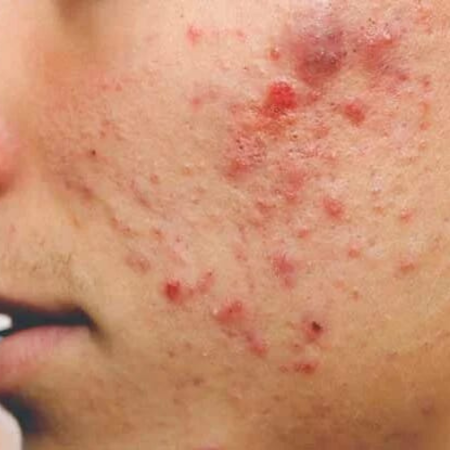Acne

Acne is a common skin condition that affects the hair follicles and oil glands in the skin. It is characterized by the presence of pimples, blackheads, whiteheads, cysts, and nodules, which can occur on the face, neck, chest, back, and shoulders. Acne typically begins during adolescence due to hormonal changes, but it can affect people of all ages.
The primary cause of acne is the overproduction of oil (sebum) by the sebaceous glands in the skin. This excess oil, along with dead skin cells and bacteria, clogs the pores and leads to the formation of various acne lesions. Hormonal changes, such as those during puberty, menstrual cycles, or hormonal imbalances, can trigger increased oil production.
Different types of acne lesions include:
Comedones: These are non-inflammatory acne lesions that can be open (blackheads) or closed (whiteheads). They occur when the hair follicles become plugged with oil and dead skin cells.
Papules: These are small, red, inflamed bumps on the skin.
Pustules: These are similar to papules but contain pus at the center, appearing as a white or yellowish head.
Nodules: Nodules are larger, painful, solid bumps beneath the skin’s surface. They can be quite sensitive and may take longer to heal compared to other acne lesions.
Cysts: Cysts are large, deep, painful acne lesions filled with pus. They are the most severe form of acne and can lead to scarring if not treated properly.
Several factors can contribute to the development or exacerbation of acne, including genetics, hormonal changes, certain medications, stress, diet, and poor skincare habits. Additionally, touching or picking at acne lesions can worsen the condition and increase the risk of scarring.
Treatment options for acne include over-the-counter topical creams and cleansers containing ingredients like benzoyl peroxide or salicylic acid. For more severe cases, a dermatologist may prescribe oral medications, such as antibiotics or isotretinoin. They may also recommend procedures like chemical peels, laser therapy, or extractions to help improve the appearance of acne or prevent scarring.
It’s important to note that treating acne can take time, and a personalized approach is often necessary since what works for one person may not work for another. It is advisable to consult with a dermatologist for a proper diagnosis and tailored treatment plan.
